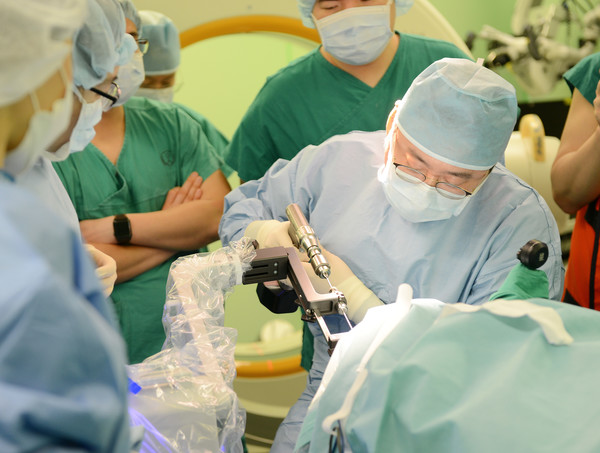Severance Hospital said Thursday that it has successfully found and removed the areas causing epilepsy after implanting electrodes in a patient's brain using a domestic surgical robot for the first time.

Professor Chang Won-seok of the Neurosurgery Department at Severance Hospital and his team have conducted the surgery using the recently adopted surgical robot. The 10-year-old girl who took the surgery recovered from the operation without showing seizures, the hospital said.
The patient who had a sudden seizure was diagnosed with cavernous hemangioma in the brain previously received surgery. However, three to four seizers a day made her schooling nearly impossible. She took medicines to treat the symptoms, but the side effects left her dazed the entire day. The girl had no other option but to go through surgery to remove the causal area in the brain.
Epilepsy is a disorder that causes abnormal seizures, repetitive loss of consciousness, convulsions, and cognitive dysfunction. It is known to occur in about 1 percent of the total population. About 360,000 people in Korea are diagnosed with the disorder under treatment. One in four epilepsy patients does not respond well to existing therapeutics and have to receive surgery.
Epilepsy surgery requires cutting a bony opening in the skull and implant electrodes, which takes about four to five hours. As a plate-shaped electrode is attached to the brain, the operation accompanied a high risk of side effects, including brain hemorrhage, paralysis, and a speech impediment.
A domestic company, Koh Young Technology, has recently developed a robot assisting brain surgery. Professor Chang Jin-woo at Severance Hospital led the clinical trials and won approval. The hospital introduced the robot called KYMERO in October 2020.
The medical team used KYMERO, which provides the patient's position and surgical tools by combining the patient's surgical site with the computed tomography and magnetic resonance image taken before surgery. KYMERO helps surgeons to avoid risky areas such as cranial nerves and blood vessels.
"Epilepsy patients have severely restricted social activities due to social prejudice and fear of their seizures," Professor Chang Won-seok said. "This surgery would be an opportunity to open up a new page for a safer and more effective robotic-assisted surgery for epilepsy in Korea."

